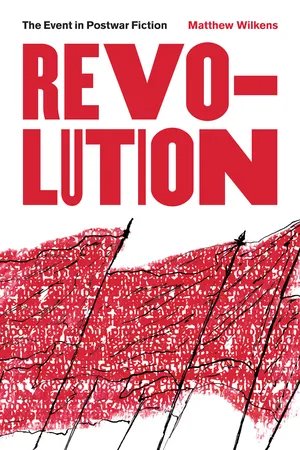
- English
- ePUB (mobile friendly)
- Available on iOS & Android
About this book
A sophisticated theoretical treatment of postwar fiction as a model of literary and cultural change.
Socially, politically, and artistically, the 1950s make up an odd interlude between the first half of the twentieth century—still tied to the problems and orders of the Victorian era and Gilded Age—and the pervasive transformations of the later sixties. In Revolution, Matthew Wilkens argues that postwar fiction functions as a fascinating model of revolutionary change. Uniting literary criticism, cultural analysis, political theory, and science studies, Revolution reimagines the years after World War II as at once distinct from the decades surrounding them and part of a larger-scale series of rare, revolutionary moments stretching across centuries.
Focusing on the odd mix of allegory, encyclopedism, and failure that characterizes fifties fiction, Wilkens examines a range of literature written during similar times of crisis, in the process engaging theoretical perspectives from Walter Benjamin and Fredric Jameson to Bruno Latour and Alain Badiou alongside readings of major novels by Ralph Ellison, William Gaddis, Doris Lessing, Jack Kerouac, Thomas Pynchon, and others.
Revolution links the forces that shaped postwar fiction to the dynamics of revolutionary events in other eras and social domains. Like physicists at the turn of the twentieth century or the French peasantry of 1789, midcentury writers confronted a world that did not fit their existing models. Pressed to adapt but lacking any obvious alternative, their work became sprawling and figurative, accumulating unrelated details and reusing older forms to ambiguous new ends. While the imperatives of the postmodern eventually gave order to this chaos, Wilkens explains that the same forces are again at work in today's fracturing literary market.
Frequently asked questions
- Essential is ideal for learners and professionals who enjoy exploring a wide range of subjects. Access the Essential Library with 800,000+ trusted titles and best-sellers across business, personal growth, and the humanities. Includes unlimited reading time and Standard Read Aloud voice.
- Complete: Perfect for advanced learners and researchers needing full, unrestricted access. Unlock 1.4M+ books across hundreds of subjects, including academic and specialized titles. The Complete Plan also includes advanced features like Premium Read Aloud and Research Assistant.
Please note we cannot support devices running on iOS 13 and Android 7 or earlier. Learn more about using the app.
Information
Table of contents
- Cover
- Half-Title Page
- Title Page
- Copyright Page
- Dedication
- Contents
- Acknowledgments
- Chapter 1. The Fifties on Their Own
- Part One: The Structure of Literary Revolutions
- Part Two: Failure and Novelty in Postwar Fiction
- Notes
- Bibliography
- Index